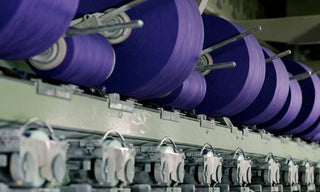Hey there, fashion-conscious folks! At Neem London, we are passionate about creating low-emitting and cleaner living menswear that looks great and positively impacts the environment. One of the ways we achieve this is by using innovative and sustainable fibres in our garments. In this blog, we want to share some of the fibres we use and how they contribute to a more ecological fashion industry.
RECOVER™
First, we have the Recover™, who take pride in their years of tradition and expertise in the recycling industry. Their approach to recycling is rooted in sustainability and is committed to minimising their environmental impact. Their process allows the delivery of dyed fibre with minimal use of solvents and water, significantly benefiting the environment. They are delighted to operate a truly closed-loop system, which means that the waste generated during the recycling process is reused, resulting in minimal waste and a more sustainable process overall.
Recover™ is a ground-breaking initiative that aims to transform how we approach sustainability and waste management. Focusing on innovation, Recover™ seeks to create a cleaner, greener future by developing efficient methods to recycle and repurpose discarded materials.
At the core of Recover™ lies its proprietary technology, which enables the efficient sorting and processing of waste materials. By harnessing cutting-edge artificial intelligence and machine learning algorithms, Recover™ can accurately identify and separate recyclable materials from complex waste streams. This innovative approach reduces the amount of waste sent to landfills and maximises the potential for recycling and reusing valuable resources.

One of the critical tenets of Recover™ is the promotion of a circular economy. Encouraging the design of products that can be easily disassembled and repurposed, It aims to minimise waste generation and extend the lifespan of materials. This sustainable approach has the potential to significantly reduce our reliance on raw materials and decrease the environmental impact of manufacturing processes.
As part of its commitment to environmental stewardship, it also actively collaborates with businesses and governments to develop policies and programs that incentivise sustainable practices. By providing support and resources to organisations willing to adopt eco-friendly measures.
ZQ MERINO
Next, we have ZQ Merino, ZQ Merino is produced by a group of New Zealand farmers who are committed to ethical and sustainable farming practices.

One of the critical benefits of ZQ Merino is its superior quality. The fibre is incredibly soft, comfortable, and durable, making it ideal for various garments, from sweaters to socks. ZQ Merino is also naturally moisture-wicking, which helps regulate body temperature and keeps you comfortable in different conditions.
Another significant benefit of ZQ Merino is its commitment to ethical production practices. This means that the farmers who produce ZQ Merino wool adhere to strict animal welfare standards, and the yarn is produced environmentally sustainable.

FERRE RECYCLED YARNS
Next up is Ferre Recycled Yarns, based in Spain, a renowned brand specialising in producing high-quality yarns made from recycled materials. With a solid commitment to sustainability and innovation, Ferre Recycled Yarns is at the forefront of the eco-friendly yarn movement.
One of the core values of Ferre is its dedication to reducing waste and promoting a circular economy. They source materials from post-consumer and post-industrial waste, such as discarded textiles and manufacturing scraps. By repurposing these materials, Ferre Recycled Yarns gives them a new life, minimising the environmental impact associated with traditional yarn production.

The yarns produced are environmentally friendly and of exceptional quality. The company employs advanced technologies and rigorous quality control measures to ensure its yarns meet the highest standards. From soft and cosy fibres suitable for garments and accessories to sturdy yarns ideal for home decor projects, Ferre Recycled Yarns offers diverse options for different knitting and crochet needs.
In addition to its commitment to sustainability, Ferre also prioritises transparency and ethical practices. They work closely with their suppliers to ensure fair working conditions and maintain strong relationships built on trust and mutual respect.

They actively support the creative community by collaborating with designers and artisans. They inspire patterns and projects showcasing their recycled yarn's versatility and beauty. By encouraging creativity and promoting sustainable choices, Ferre Recycled Yarns aims to foster a more conscious and responsible approach to crafting.
Whether you're a seasoned knitter or a beginner, choosing Ferre Recycled Yarns allows you to indulge in your passion while positively impacting the environment. By embracing their recycled yarns, you contribute to reducing textile waste and support a brand that values sustainability and craftsmanship.
Ferre Recycled Yarns is a shining example of how innovation and environmental consciousness can create beautiful and sustainable products. Their dedication to quality, transparency, and eco-friendly practices makes them a leader in recycled yarns, inspiring others to pursue a greener future.
SÖKTAŞ
Regenerative cotton is an innovative approach to cotton farming that focuses on regenerating the soil and promoting biodiversity while reducing the environmental impact of cotton production. Our next fibre is Regenerative cotton SÖKTAŞ, a prominent Turkish textile company known for its commitment to sustainable practices. It has embraced regenerative cotton as part of its efforts to create more eco-friendly and responsible textiles.
Traditional cotton farming methods often involve synthetic fertilisers, pesticides, and excessive water consumption, which can harm soil health and surrounding ecosystems. In contrast, regenerative cotton farming emphasises organic practices, soil conservation, and ecosystem restoration.

SÖKTAŞ recognises the importance of regenerative agriculture and has taken steps to source cotton from regenerative farming systems. By partnering with farmers who follow regenerative practices, SÖKTAŞ supports the restoration of soil health, enhances biodiversity, and reduces the need for synthetic inputs.
Regenerative cotton farming builds healthy soil through cover cropping, crop rotation, and composting. These practices improve soil structure, increase water retention, and promote the growth of beneficial microorganisms, thereby reducing erosion and enhancing the land's natural fertility.
By choosing regenerative cotton, SÖKTAŞ contributes to conserving natural resources and supports the well-being of farmers and local communities. Regenerative farming systems often prioritise fair labour practices and empower farmers by providing them with the knowledge and tools to adopt sustainable agricultural techniques.
SÖKTAŞ incorporates regenerative cotton into their textile production processes, creating sustainable and quality fabrics. These fabrics offer the same comfort, durability, and aesthetic appeal as conventional cotton while aligning with SÖKTAŞ's vision of minimising environmental impact.
By promoting regenerative cotton, SÖKTAŞ sets an example for the textile industry and encourages adopting sustainable practices throughout the supply chain. Their commitment to regenerative agriculture demonstrates a forward-thinking approach prioritising the planet's health and future generations' well-being.
Through their dedication to regenerative cotton and other sustainable initiatives, SÖKTAŞ strives to create a positive impact and contribute to a more sustainable and responsible textile industry.
RECYCLED NYLON
Lastly, we have recycled nylon made from post-industrial waste. This is a great way to reduce the amount of plastic waste in our oceans and landfills while also creating high-quality, durable fibres that can be used in fashion production.
We hope this gives you a better understanding of some of the fibres we use at Neem London and how they contribute to a more sustainable fashion industry. By choosing sustainable fibres, you can feel confident supporting a more sustainable and ethical fashion industry.
We create fashion that looks good and does good.


